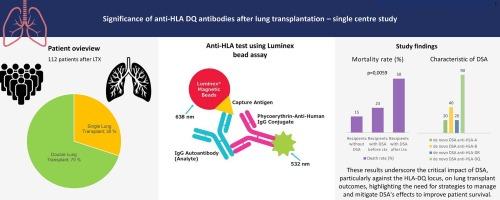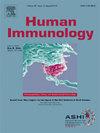肺移植后抗hla - DQ抗体的可能意义-单中心研究
IF 2.2
4区 医学
Q3 IMMUNOLOGY
引用次数: 0
摘要
抗hla抗体在实体器官移植中的作用早已被认识到,特别是在移植排斥和患者生存方面。本研究旨在评估新生供体特异性抗体(DSA)对波兰肺移植受者移植失败和死亡率的影响。该研究包括112名移植前免疫状态良好的患者。使用Luminex平台评估抗hla抗体的存在和特异性。我们确定了26例(23%)免疫风险增加的患者。在13例受者中检测到移植前dsa。移植后,评估重新发生dsa的情况,累积发生率为11%。我们的研究结果证实,接受供体特异性免疫的肺移植受者经常产生针对HLA-DQ位点抗原的抗体。值得注意的是,90%(10人中有9人)的免疫患者显示出高平均荧光强度(MFI)水平的抗dq抗体。这些抗体被证明是有害的,免疫患者的死亡率明显更高:50%的抗dq抗体患者死亡,而没有dq抗体的患者只有15%死亡。这是波兰人群中第一个此类研究,证实预防和治疗DQ dsa的策略可以改善肺移植受者的预后。本文章由计算机程序翻译,如有差异,请以英文原文为准。

Possible significance of anti-HLA DQ antibodies after lung transplantation – Single centre study
The role of anti-HLA antibodies in solid organ transplantation has long been recognized, particularly with respect to graft rejection and patient survival. This study aimed to evaluate the impact of de novo donor-specific antibodies (DSA) on graft failure and mortality in Polish lung transplant recipients. The study included 112 patients who had a well-defined immune status prior to transplantation. The presence and specificity of anti-HLA antibodies were assessed using the Luminex platform. We identified 26 patients (23%) as having increased immunological risk. Pre-transplant DSAs were detected in 13 recipients. Post-transplantation, the development of de novo DSAs was evaluated, with a cumulative incidence of 11%. Our findings confirmed that lung transplant recipients with donor-specific immunization frequently develop antibodies targeting antigens at the HLA-DQ locus. Notably, 90% (9 out of 10) of immunized patients exhibited high mean fluorescence intensity (MFI) levels of anti-DQ antibodies. These antibodies were shown to be harmful, with mortality significantly higher in immunized patients: 50% of patients with anti-DQ antibodies died, compared to only 15% in those without DSAs. This is the first study of its kind in the Polish population, confirming that strategies to prevent and treat DQ DSAs may improve outcomes for lung transplant recipients.
求助全文
通过发布文献求助,成功后即可免费获取论文全文。
去求助
来源期刊

Human Immunology
医学-免疫学
CiteScore
5.40
自引率
7.40%
发文量
107
审稿时长
12 days
期刊介绍:
The journal''s scope includes understanding the genetic and functional mechanisms that distinguish human individuals in their immune responses to allografts, pregnancy, infections or vaccines as well as the immune responses that lead to autoimmunity, allergy or drug hypersensitivity. It also includes examining the distribution of the genes controlling these responses in populations.
Research areas include:
Studies of the genetics, genomics, polymorphism, evolution, and population distribution of immune-related genes
Studies of the expression, structure and function of the products of immune-related genes
Immunogenetics of susceptibility to infectious and autoimmune disease, and allergy
The role of the immune-related genes in hematopoietic stem cell, solid organ, and vascularized composite allograft transplant
Histocompatibility studies including alloantibodies, epitope definition, and T cell alloreactivity
Studies of immunologic tolerance and pregnancy
T cell, B cell, NK and regulatory cell functions, particularly related to subjects within the journal''s scope
Pharmacogenomics and vaccine development in the context of immune-related genes
Human Immunology considers immune-related genes to include those encoding classical and non-classical HLA, KIR, MIC, minor histocompatibility antigens (mHAg), immunoglobulins, TCR, BCR, proteins involved in antigen processing and presentation, complement, Fc receptors, chemokines and cytokines. Other immune-related genes may be considered.
Human Immunology is also interested in bioinformatics of immune-related genes and organizational topics impacting laboratory processes, organ allocation, clinical strategies, and registries related to autoimmunity and transplantation.
 求助内容:
求助内容: 应助结果提醒方式:
应助结果提醒方式:


